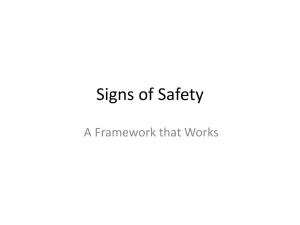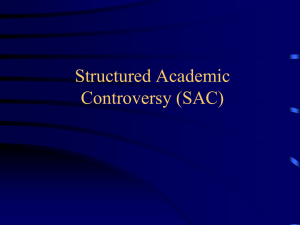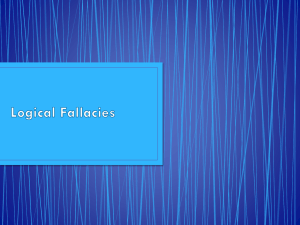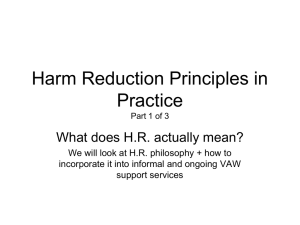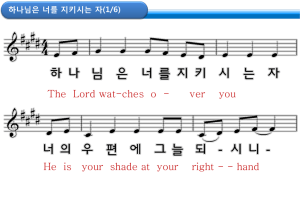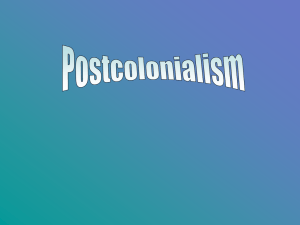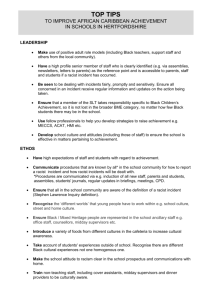Freedom of Expression and Emotional Harm
advertisement
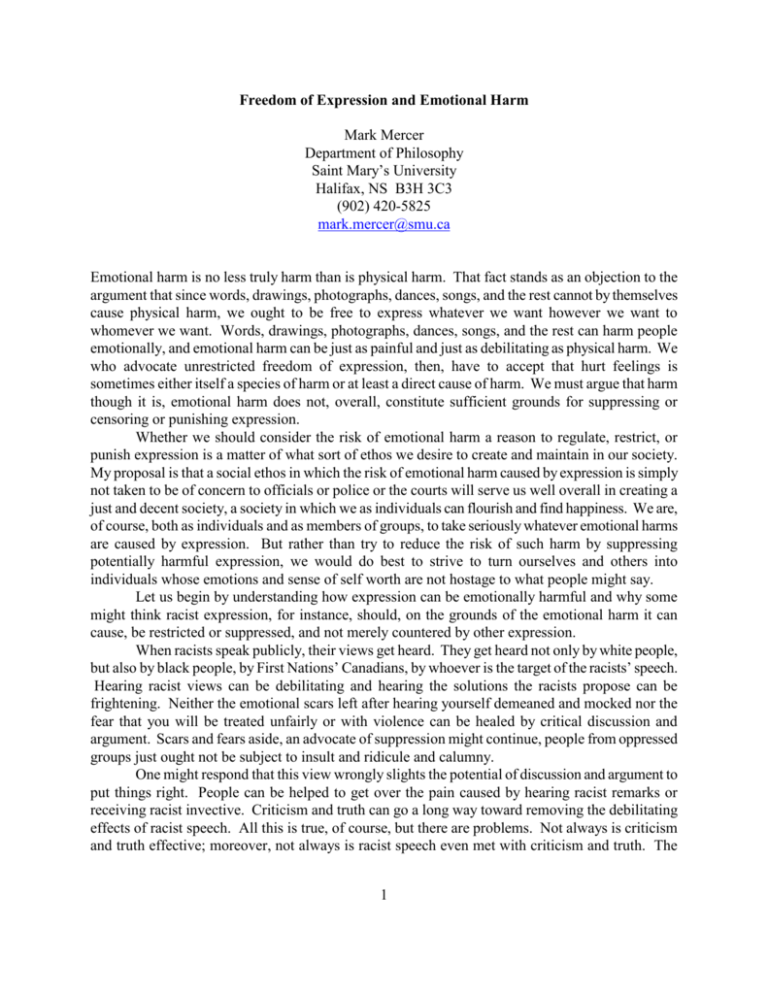
Freedom of Expression and Emotional Harm Mark Mercer Department of Philosophy Saint Mary’s University Halifax, NS B3H 3C3 (902) 420-5825 mark.mercer@smu.ca Emotional harm is no less truly harm than is physical harm. That fact stands as an objection to the argument that since words, drawings, photographs, dances, songs, and the rest cannot by themselves cause physical harm, we ought to be free to express whatever we want however we want to whomever we want. Words, drawings, photographs, dances, songs, and the rest can harm people emotionally, and emotional harm can be just as painful and just as debilitating as physical harm. We who advocate unrestricted freedom of expression, then, have to accept that hurt feelings is sometimes either itself a species of harm or at least a direct cause of harm. We must argue that harm though it is, emotional harm does not, overall, constitute sufficient grounds for suppressing or censoring or punishing expression. Whether we should consider the risk of emotional harm a reason to regulate, restrict, or punish expression is a matter of what sort of ethos we desire to create and maintain in our society. My proposal is that a social ethos in which the risk of emotional harm caused by expression is simply not taken to be of concern to officials or police or the courts will serve us well overall in creating a just and decent society, a society in which we as individuals can flourish and find happiness. We are, of course, both as individuals and as members of groups, to take seriously whatever emotional harms are caused by expression. But rather than try to reduce the risk of such harm by suppressing potentially harmful expression, we would do best to strive to turn ourselves and others into individuals whose emotions and sense of self worth are not hostage to what people might say. Let us begin by understanding how expression can be emotionally harmful and why some might think racist expression, for instance, should, on the grounds of the emotional harm it can cause, be restricted or suppressed, and not merely countered by other expression. When racists speak publicly, their views get heard. They get heard not only by white people, but also by black people, by First Nations’ Canadians, by whoever is the target of the racists’ speech. Hearing racist views can be debilitating and hearing the solutions the racists propose can be frightening. Neither the emotional scars left after hearing yourself demeaned and mocked nor the fear that you will be treated unfairly or with violence can be healed by critical discussion and argument. Scars and fears aside, an advocate of suppression might continue, people from oppressed groups just ought not be subject to insult and ridicule and calumny. One might respond that this view wrongly slights the potential of discussion and argument to put things right. People can be helped to get over the pain caused by hearing racist remarks or receiving racist invective. Criticism and truth can go a long way toward removing the debilitating effects of racist speech. All this is true, of course, but there are problems. Not always is criticism and truth effective; moreover, not always is racist speech even met with criticism and truth. The 1 most serious problem with this response is that criticism and truth are not merely unreliable tools with which to put things right after the fact; sometimes they are simply not tools at all. With the racist words themselves comes the hurt and the harm and no putting things right after the fact can change that. To pretend otherwise would be like thinking that since good medical care can heal broken bones, there’s no need for laws to protect people from beatings. Getting over a broken bone is no substitute for remaining intact in the first place. Emotional harm is harm, and cannot always be put right; and hurt is hurt, whether it is to one’s arm or to one’s feelings. And yet we ought not, as a society or as individuals, censor or suppress racist or other vile expression, and we ought not punish those who through what they say or draw or dance hurt or harm others. The argument for freedom of expression despite the harm expression can cause has two parts. The first appeals to certain ideals embodied in freedom, the second to the bad consequences of suppression. The first part, then, concerns principles, traditional liberal principles, while the second part concerns realities, the consequences we have begun to live as freedom of expression, and other of our civil liberties, has eroded. Tolerating racist and other vile expression is part of our commitment to treat each other with respect. Respect for others is the traditional liberal ideal at the centre of this argument. Our commitment isn’t, of course, a commitment simply to return respect for respect. It is a commitment to treat respectfully those who abuse us and even those who do us violence. When we sanction or punish people for mistreating us or others, we do so openly and honestly, for we recognize miscreants and criminals as persons just as we are. Whatever the racist wishes to say, respect for her as a person requires that we don’t interfere with her saying it. This is because to interfere with her expression of her views would be to neglect her interest in self expression and self creation. We hold it worse that someone is forced down the right path than that they choose to take the wrong path. Further, a person’s interest in self expression points to an important political dimension of censorship and suppression, specifically, the principle of the consent of the governed. To deny a person the means to get his opinions heard publicly is to render him unable to consent to the laws of the land. Not having had his say and his opportunity to influence public opinion, he cannot accept that the laws that govern him were fashioned through a fair procedure. Thus, he cannot accept to be governed by them. His adhering to them can only be a result of his fear of the consequences of breaking them. To suppress racist speech is, then, to fail to uphold the democratic ideal according to which all people subject to the law must be able freely to consent to be subject to it. To censor or suppress racist speech is, then, to manifest disrespect toward racists. But it is also to manifest disrespect toward those who might hear racist speech, and even toward those whom racist speech is meant to harm. To censor or suppress racist speech would be to show disrespect toward all who might otherwise hear such speech, for it would be to deny that audience the opportunity to consider and evaluate racist views for themselves. That would be to manipulate that audience into the proper attitudes, for they would not be finding them for themselves. Censorship and suppression render all of us unfree to seek out and to listen to whatever views are current and then to make up our own minds. Now consider the people racist speech is intended to hurt and harm. Censorship and suppression intended to protect vulnerable groups might perhaps succeed in doing what it is intended 2 to do (there have been few empirical studies of the matter). Still, paternalistic measures such as suppression are disrespectful towards those they are meant to protect and, hence, are illiberal. They deny the people targeted by racist speech knowledge of what those who would denigrate or malign them think of them. They render them unable to evaluate for themselves what is said about them and to fashion for themselves appropriate responses to what they hear. Tolerating racist and other potentially harmful speech is, then, a requirement of respect for others. A commitment to treat people with respect is partly constitutive of liberalism, an attractive and satisfying way of life, and so recommends itself to us on principle. This point, that freedom of expression is a value partly constitutive of liberalism, needs to be made clearly, for those who would restrict freedom of expression often make a basic mistake. They suppose that freedom of expression must be for something. Freedom of expression, they say, is for criticising those in power or for drawing attention to abuses or dangers or for disseminating information. Since freedom of expression is for this particular end, they reason, expressions outside the realm of what freedom of expression is for may, then, properly be controlled or restricted in the name of some important social goal. A person who values freedom of expression only instrumentally, if at all, will not much care that expression is restricted or suppressed in areas in which freedom of expression has no good job to do. If suppressing racist expression or ethnic slurs would not much impede the growth of knowledge or whatever, then, say those who don’t value freedom of expression intrinsically, let us suppress them; there’s nothing lost in suppressing racist speech, so there’s nothing to balance against the good of simply not hearing racist speech. If suppressing racist expression would in the bargain serve a noble social goal such as racial equality or better relations among people of different races, then we have excellent reason to suppress racist expression. But those of us passionate about freedom of expression want it for its own sake, not (only) for the sake of something else. We simply like that we and others will say what we want to say, and so we are keen that people be free to express themselves without fear of being silenced or punished by an authority. We love freedom of expression for itself as we love many other things for themselves: our friends, political equality, knowledge, that our students become competent and committed intellectuals, the happiness and well being of our fellow citizens or of people generally, social justice, philosophy, the music of Serge Gainsbourg, beauty, our children, our pets, tennis, whatever. For us, freedom of expression is not merely a tool useful (or not) in promoting something valuable. It is, rather, something we value for its own sake on par with many other things we value for their own sakes. Sometimes, of course, people have to make compromises among those things that matter to them for their own sakes. A person’s deep commitment to something can in a case conflict with her deep commitment to another thing. She will then have to choose against something that she likes or loves for its own sake. Such choices are hard. We do not find it easy to forsake something that matters to us and we regret having to do so. So valuing freedom of expression intrinsically, as partly constitutive of a way of life, is consistent with holding that this or that restriction on expression is justified in light, say, of threats to equality, or the plight of members of a beleaguered and vulnerable minorityBor because of something else that matters deeply. One who loves freedom of expression for its own sake, and not simply instrumentally, would, though, be terribly sad to have to advocate restrictions on expression, 3 for to do so would be to forsake a goodBbut, were the situation dire and the means crucial, advocate restrictions she would. Now, then, we come to the question that must be answered in the second part of the argument: is anywhere the situation dire and the meansBrestrictions on expressionBcrucial to rectifying the situation? What about the harm we have said racist speech can cause? Is racist speech not, then, in virtue of that harm, a case in which restrictions on expression recommend themselves even to those who value freedom of expression for its own sake? First, of course, whether suppressing racist expression will promote important social goals is an empirical question. Given a particular community and an understanding of what constitutes racist expression, it is an matter for empirical research whether laws against such expression, or whether any other forms of suppressing such expression, will have the effect of promoting goals of equality or justice or flourishing. No doubt collecting evidence one way or the other will be difficult. And, importantly, the relevant social or personal factors within a community can change over time and often do change, sometimes quickly, rendering obsolete results that were once perfectly relevant to questions of policy. Still, psychologists and social scientists who study the matter might very well produce valid results useful to contemporary policy makers. In the end, only in light of such resultsBempirical results that restrictions on racist speech themselves promote the flourishing of individuals from groups toward which such speech is directedBcould those of us who love freedom of expression for its own sake and value it as part of our liberal outlook have sufficient reason to endorse policies of restriction and suppression. Would that whatever research there is on this problem were more widely known and discussed! Short of having good empirical information, we ought not imagine we know restrictions and suppression will produce the good we seek. Sadly, few if any of the restrictions on racist expression currently in place in Canada or in our universities or on our streets or in our workplaces have come about because of empirical results showing that such restrictions have good effects. Take, for instance, the hate propaganda laws in the criminal code of Canada. Or the confiscation by the President of the University of Prince Edward Island of an edition of a student newspaper carrying the Jyllands-Posten cartoons, the set of cartoons published in 2006 some of which include caricatures of Mohammed. Or the order the Vice-President Academic of Saint Mary’s University, in Halifax, issued to a professor to remove those cartoons from that professor’s office door. In none of these cases was empirical evidence that restriction or suppression of offensive materials has good effects used to justify the restrictions or suppression. (The public safety concerns floated in the last two cases, even if sincere, were secondary to concerns about offence and hurt feelings.) On the other hand, at least one great contemporary liberation movement, that of lesbians and gays, has succeeded as well as it has without the protection of restrictions on homophobic speech. (The restrictions on homophobic speech now in place only came after social attitudes toward lesbians and gays had changed and many barriers to living as a lesbian or a gay man were removed.) In any case, empirical evidence one way or the other regarding the effectiveness of censorship and suppression as a tool of liberation and progress is either lacking or in hiding. Turn now, then, to the damage to society that suppression of racist speech and other expression is causing. For one, candour has suffered; people are afraid to say what they think or even just to think aloud for fear of ostracism or worse. But candour is indispensable to productive discussion and debate of any social or political problem. Unless we know what is on people’s minds we will not be able to identify many of the problems we face or evaluate properly proposed solutions 4 to them. And, of course, restrictions on expression have a chilling effect on research and the dissemination of research. For another, restrictions on speech, embodying as they do authoritarian attitudes, promote authoritarianism generally. They create a priestly class of censors and other public officials. More and more will this class claim power and less and less will people resist its claims. An inference essential to priests and authoritarians is this: X is wrong, therefore X ought to be illegal and Xers ought to be punished. To the extent that people in a society employ this inference in their thinking, authoritarianism is the will of the people in that society. It is distressing presently how wide-spread acceptance of that inference is. It seems to me that the rise of identity politics and its attendant illsBthe cult of victimization, for instance, or the promotion of diversity as a good in itselfBis both a cause and a result of the authoritarian attitudes underlying censorship and suppression of expression. As restrictions on speech become political goals for various identity groups, more and more classes of expression will fall under the censor’s eye. More and more will individuals look to their group for their sense of self and self worth, and more and more will they look to leaders and government for protection and spoils. Of course, this creates a dependence on others inimical to ideals of individual strength and responsibility and achievement. That is the second argument, then, the argument from what would happen in practice, against censorship and suppression even of vile racist expression. Public life suffers when people are not candid. Censorship and suppression require censors and other officials who can see what we cannot see and who can make decisions for us without our being able to evaluate those decisions. That sort of authoritarianism poses grave dangers to much that we care about. Rather than citizens and neighbours attempting to live our lives and flourish, we become wards of the state, and we wear our grievances as badges of honour and power. I can see two very different lines of critical response to this defence of wide freedom of expression. The first is simply that my worries about a chilly climate, identity politics, and creeping authoritarianism are inflated. The climate isn’t particularly chilly for any but the real racists, and that’s fine, identity politics is a useful tool on the road to inclusiveness and social justice and will fade away as we near our destination, and authoritarianism is not any more a threat now than it has always been in liberal democracies. Meanwhile, blacks and others suffer real harms from expression and a mild dose of enforced good manners would spare these people at least a few of them. This line of critical response does not deny anything in the first argument, the argument that freedom of speech is a requirement of respectful treatment of others and something that can properly be prized for its own sake. Instead, it challenges my contention that on balance, restrictions on speech is a bad idea by proposing that on balance, a few restrictions is a good idea. Until we have relevant empirical studies of the effects of restrictions on speech, neither side will have the upper hand, and even then it might be a matter of what one dislikes more, the speech or the suppression of the speech. It’s not beside the point, though, to note in the context of this response that much can be done right here and now to bring us closer to the goals of social justice and equality of opportunity without censoring or penalizing hurtful expression. Schooling, housing, policing, jobs, public spaces for recreation and socializingBthese are the areas where our efforts will go far to improve people’s lives. Success in these areas will do much more good than success in banning hurtful expression ever could. 5 The second line of critical response is to question whether the ideals of personal responsibility and emotional resilience, of respect for others generally, of democracy are really the ideals we should strive to embody individually and socially. Those who take this line are not troubled by identity politics or authoritarianism. They don’t mind identifying the forbidden with the wrong. There is no plain or theoretical answer to this line of response. Those of us who espouse the worth of the individual person in her particular struggles and successes must, instead, turn to action, and show by example how wonderful it is to live in the light of liberal values. 6
